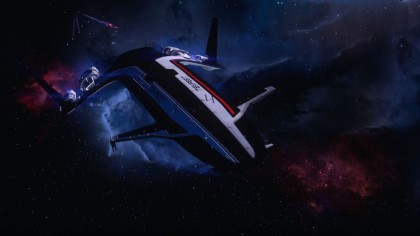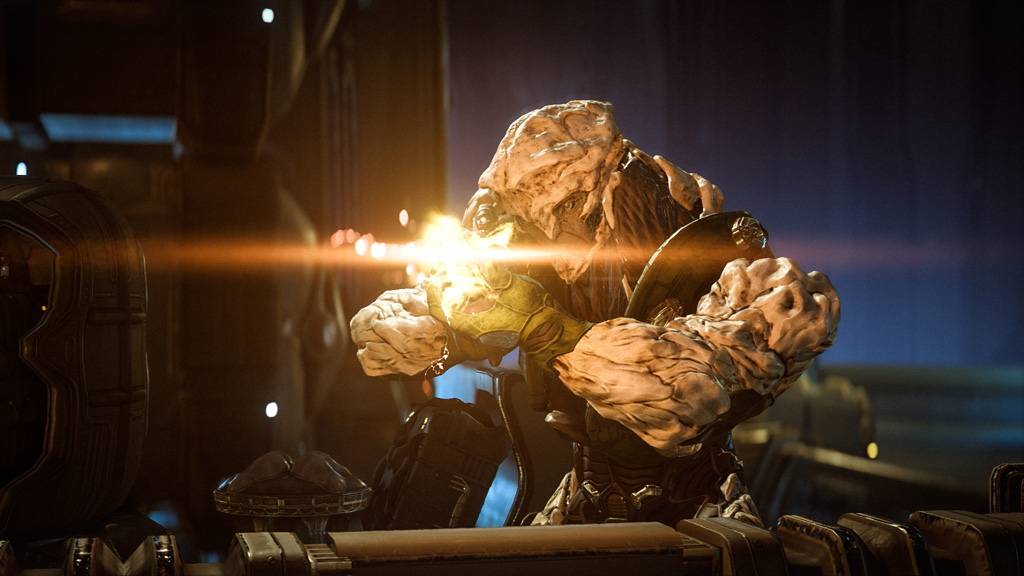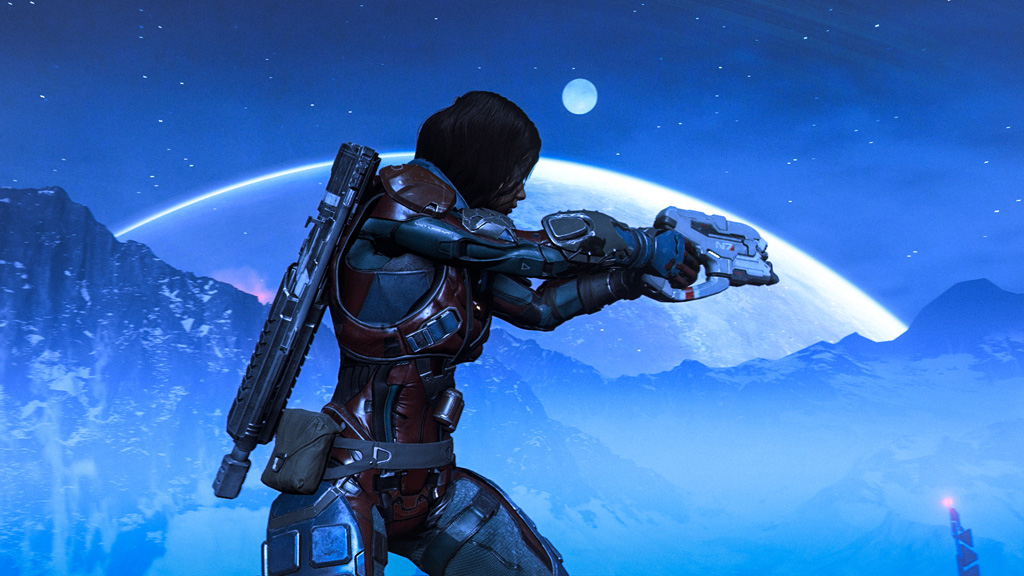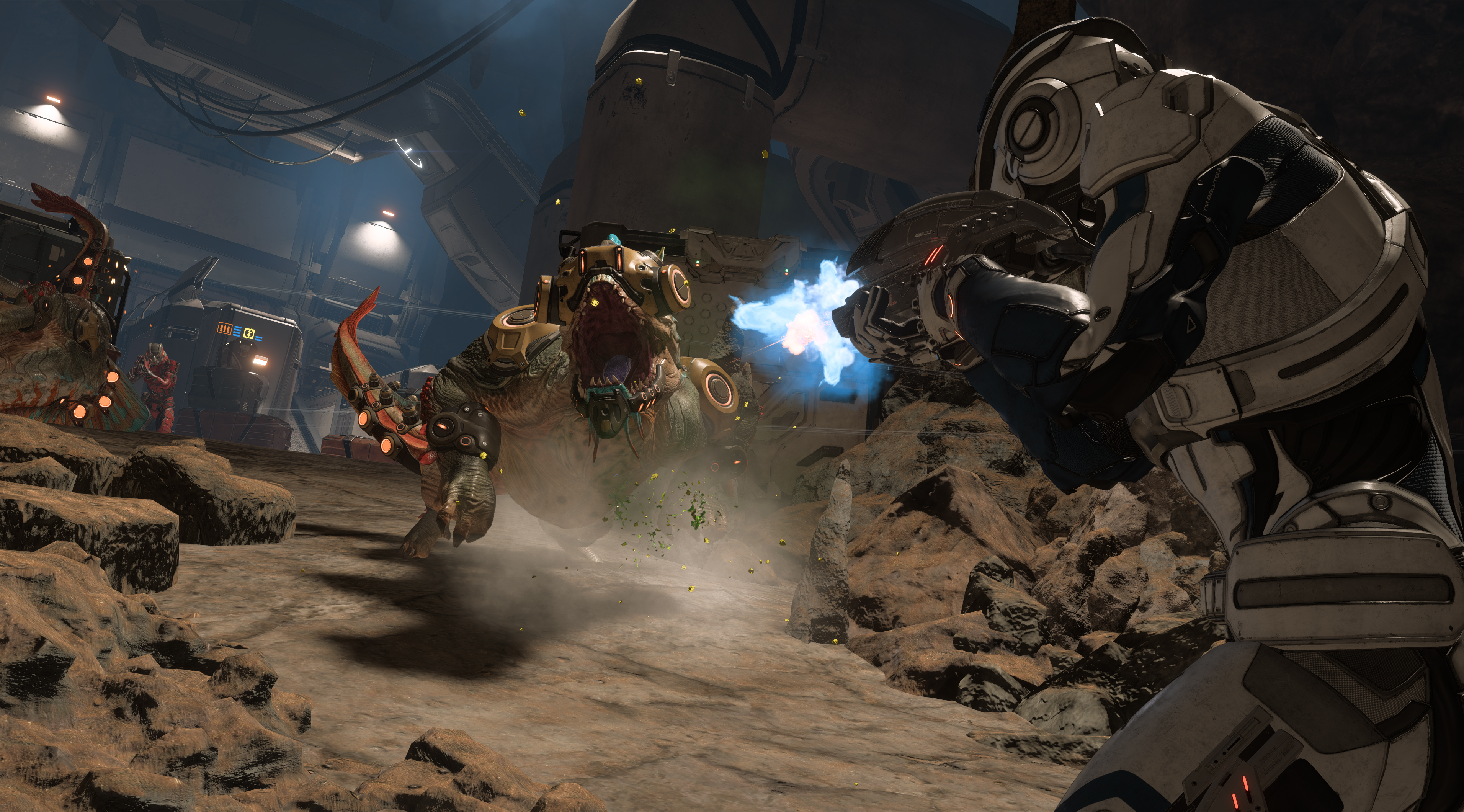Mass Effect: Andromeda is 2017's ultimate love/hate relationship
A game that's neither a Renegade nor a Paragon

Though the official release date of Mass Effect: Andromeda isn’t here just yet, saying the game’s reviews and fan first impressions from the early access trial are looking less than stellar would be an understatement.
We’re currently playing the game ourselves and have found ourselves torn. Mass Effect: Andromeda has many wonderful features and additions that we’ve greatly enjoyed exploring.
However as good as they are these features are, they frequently either overreach or don't take full advantage of their potential. Sometimes, incredibly, it manages to be both of these issues at the same time.
Seemingly taking inspiration from its changed morality system, Mass Effect: Andromeda is neither a Renegade or Paragon of a game – it’s not outrightly good or bad, it’s something in between.
Like the friend with the heart of gold that constantly needs to be told, "I know you're better than this," it just doesn’t seem fair to let Andromeda's occasionally significant faults get in the way of its often successful attempts to do right.
As a result, we’ve put together a compliment sandwich of sorts, celebrating BioWare’s neat additions to Mass Effect: Andromeda but acknowledging where they fall short or go way too far.

A whole new galaxy...that's a chore to explore
First up is Andromeda itself. This latest addition to Mass Effect is leaving the familiarity of the Milky Way behind and taking it to the brand new Andromeda Galaxy. This means entirely new planets to explore and a chance to experiment with the game’s maps.
Sign up for breaking news, reviews, opinion, top tech deals, and more.
BioWare seizes on this opportunity and it’s safe to say that as game worlds go, this is a stunning one. The planets are diverse with beautiful vistas and the game’s galaxy map is a pleasure to look at.
Beautiful as it is, though, the galaxy map does trip up with self-indulgent transition animations between every single place you want to travel. Travelling to a new system in the galaxy? Transition animation. Travelling to a planet within that system? Another transition animation with an unnecessary and prolonged zoom-in before the camera chills the hell out and actually lets you interact with something.
Yes, these animations are lovely to look at but you’ll grow tired of them pretty quickly. Particularly if you’re just trying to quickly move between several planets quickly.
Once you’re on the surface of a planet, the first thing you’re likely to notice is that the maps are huge. Mass Effect: Andromeda places an emphasis on exploration though it stops short of being a sandbox game. Instead, Andromeda tries to strike a balance between linearity and open world gameplay.
This is a welcome effort from BioWare it's easy to feel beleaguered by the recent onslaught of open world games touting procedural generation as the way forward. In Andromeda, each level has been hand-designed so you're never in an area for no reason, whether that's for a main story quest or one of the numerous side quests that populate the map.
This is both a good and a bad thing; though you’re always going to have a sense of purpose and a main quest to follow, it’s easy to find yourself picking up dozens of side quests en route and completely losing focus.
You’ll never find yourself on a planet for no reason but sometimes you’ll feel like you have too many reasons not to move to another one.

The game does occasionally try to force you back on track. For example, on the planet Eos it’d be tempting to make sure you stay on the planet and cover absolutely every side quest there before moving on never to return but the game doesn’t allow this. Instead, the settlement’s mayor tells you top hop back on your ship, get your shit done elsewhere and he’ll tell you when he needs you.
This is a productive way for the game to get in your way. A less productive example is when the game decides to change which quest you’ve opted to prioritize without telling you. We’re not sure whether this is a bug or just an unhelpful feature but we found that sometimes if we were engaged in a side quest and new main quest information came through, the game would without warning change the active quest.
Timely interruptions are fine but forcing us away from what we’re already invested in is just annoying.
A space game without a feeling of expansiveness would be a poor space game indeed, and Andromeda manages to capture a sense of scale without ever letting you feel like you're not moving forward.

Fresh faces...with stale personalities
A new galaxy and timeline also means a new cast of characters and brand new alien races to interact with. Anyone that’s played Mass Effect before will be glad to see the return of the Turians, Krogans, Salarians, and Asari.
There are also new races: the Kett, Angara, and the Remnant.
Your relationship with the Kett is immediately acrimonious and ends up feeling kind of unsatisfying. Ultimately it just feels like the cartoonish Kett are there to offset any uncomfortable colonizing themes that may have arisen from invading a new galaxy.
Still, at least there’s a whole new cast of characters to get to know. One of the best things about Mass Effect, and BioWare games generally, is forming deep relationships with your crew.
Every Mass Effect game has fallen victim to moments of incredibly cheesy and dramatic dialogue but these moments have always been cancelled out by some genuinely wonderful interactions between the player and their crew that showcase skilled character creation and development.

There’s plenty of questionable speeches and dialogue (actually sometimes it feels like there are more of these moments than ever but that could be us falling victim to our selective memories) but there are still great one-on-one moments to enjoy.
From what we’ve played so far, every member of our crew has a personal story thread that we’d like to pull on and unravel but it feels like much more of a slog for some characters than others. Andromeda’s alien characters are much more interesting and fun to get to know than its human characters.
Human characters, most notably Liam and Gil, often feel uninspired. Liam’s voice-acting is too flat to inspire engagement and Gil. . . well.
Not every Mass Effect character is there for you to like, obviously, that’s part of the fun. But it’s rare that we’ve ever felt a character is boring. Fortunately, there are more than enough interesting characters in the game to pull you along.

A more nuanced dialogue system...that feels less impactful
It’s unfortunate that some of the characters are so uninspiring as Mass Effect: Andromeda’s new approach to dialogue actually makes you feel like you’re building a proper dynamic relationship with these characters.
Mass Effect: Andromeda has dropped the Renegade and Paragon morality and dialogue system and replaced it with something similar to the dialogue wheel of Dragon Age: Inquisition.
It’s no longer a case of ‘good’ or ‘bad’ and though this makes conversations more difficult to navigate in one sense it makes the characters you’re interacting with feel more like they’re complex beings rather than morality barometers. With this system it’s going to be hard to get everyone to like you but that’s enjoyably true-to-life.
Though it's hard to get everyone to like you, it can also be hard to get anyone to hate you.
Being unable to reach these extremes means that for a good chunk of the first hours of the game, you’ll feel like you’re not having much of an emotional impact on anyone, and it’s hard to get an immediate sense that something you’ve said in a conversation with a character has had any lasting impact.
The more you get into the game and the more characters develop, though, the more you’ll appreciate this change. It’s a slow burning feature that does come into its own and encourages investment in character relationships.
It makes it possible for you to feel like you’re developing platonic friendships as well as laying the groundwork for romance. More than any other Mass Effect game, this new dialogue system creates a sense that there’s more than one kind of ‘love’ and feelings aren’t binary.

Stat-tastic mechanics...that can feel overwhelming
Depth in games is great but sometimes it can be overwhelming. Mass Effect: Andromeda gives you a lot of numbers and stats to keep track of and doesn't make it easy to do so.
Though crafting weapons and armor isn’t essential to play the game well, Mass Effect: Andromeda’s crafting system is difficult to become invested in.
It requires keeping track of three different kinds of research points (Milky Way, Heleus and Remnant) that can go into developing three different kinds of technology. To build up these research points you have to make sure you scan everything you can while you explore planets as well as collect every material you come across to facilitate development. Development requires lots of different materials and large quantities of them which can put a lot of pressure on your inventory and managing that is a pain.
This is made worse by all the other stats the game asks you to contend with which range from skills points to profile levels to colony viability points. Throw in a confusingly laid out UI and you've got a recipe for frustration and confusion.

More agility in battles...but your squad mates will have trouble keeping up
The combat system in Andromeda builds on the system of Mass Effect 3 and improves upon it.
The most obvious new addition is the jump jet. Not only does this make exploring the open game world more fun, it’s a great feature in combat as it makes Ryder feel much more agile and it’s a great way to quickly get to higher ground and the tactical advantages that offers.
This feature combined with the intuitive cover system makes combat feel extremely fluid.
A downside is that you don’t really have much control over what your squad mates are doing or the weapons they’re using this time around and sometimes you’ll really wish you did as they dart around you like excitable puppies.
Admittedly, you don’t need that much control around your squad’s abilities as you did in previous Mass Effect games as you can change your own character's abilities much more easily this time.
Rather than a class system, you’re now able to develop abilities from three trees: combat, tech, and biotics. Spending points across these trees will allow you to unlock and change between different profiles which augment the various abilities you’ve developed.
This system is great as it gives you a great deal more freedom in fights and keeps things interesting. It does, however, encourage and reward generalization much more than specialization so those that like to focus on one combat style may find themselves less satisfied.
For a game that puts a lot of focus on the idea of ‘coming in peace’, Mass Effect: Andromeda has managed to create a versatile and enjoyable combat system.
Conclusion: A compliment sandwich of a game
Overall, from what we’ve played so far Mass Effect: Andromeda is a game that does a fair few things wrong but there’s also a lot it does right.
BioWare has created an incredibly beautiful game world that really inspires a sense of exploration and discovery. It's hard to strike a balance between open exploration and linearity and though Andromeda does an admirable job you can sometimes feel bogged down by the number of side quests you're engaged in alongside the main quest.
Though the game's new dialogue system makes things a little less black and white and really encourages investment in character relationships, it does burn slowly and some of the new characters just aren't interesting enough to hold your attention through this slow start.
There are lots of interesting gameplay mechanics to become invested in, including research, development and making planets more viable for your people to live on but the stats you have to keep track of for this wide array of things on top of personal character stats can feel overwhelming.
Fortunately, combat is simplified, fluid and fun which offsets some of that complexity.
It seems unfair to let the bad cancel out the good but that doesn’t mean we’re not going to point it out for what it is. So far, we’re still enjoying our time in the Andromeda galaxy and though there’s been much that’s frustrated us, it’s not stopped us from wanting to explore further and that’s got to be to BioWare’s credit.
Stay tuned for our full review of Mass Effect: Andromeda, coming soon.

Emma Boyle is TechRadar’s ex-Gaming Editor, and is now a content developer and freelance journalist. She has written for magazines and websites including T3, Stuff and The Independent. Emma currently works as a Content Developer in Edinburgh.